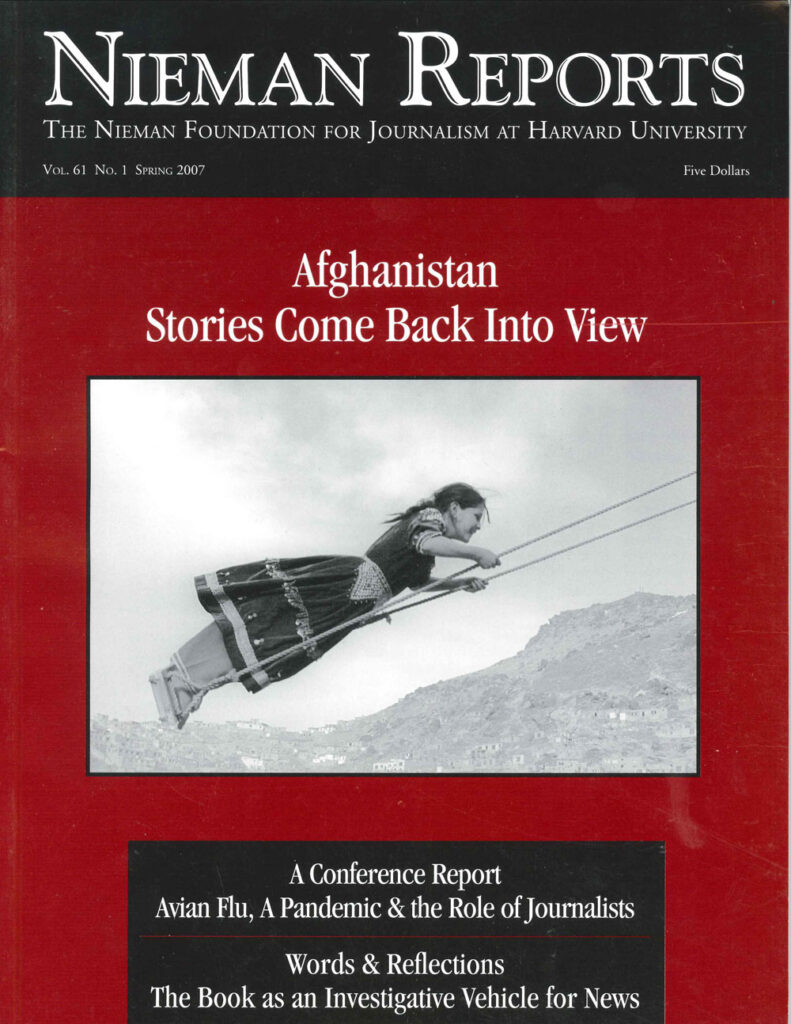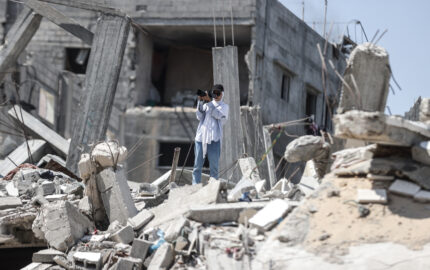Afghans are the most hospitable people on earth, offering everything when they have nothing. I was thinking it was unlike them not to offer tea to visitors, but Major Blair seemed quite happy.
"I think that went well — they seemed quite friendly," he said to me as we walked away.
Almost immediately a burst of gunfire rang out from the ridge to the left where the Fire Support Group was deployed.
"We've had a contact," came the message over the radio.
They had spotted a gathering of 12-14 men all dressed in black and armed.
Two of the support group's vehicles had peeled off to try to intercept them; but as they did so rocket-propelled grenades started to rain in on the support base — followed by small arms fire.
For a moment, we stood staring up at the ridge listening to the gunfire and explosions. Then we started walking again through a field, looking for the bridge.
Within seconds we heard the staccato crack of Kalashnikovs. I threw myself into a ditch as bullets whizzed overhead.
"Helmets on!" shouted someone. "Put your f****** helmets on!"
I followed the paratroopers, running for our lives across the fields. The ground had been ploughed weeks before and had baked hard into dry, treacherous ridges. We stumbled over the furrows, with bullets and loud explosions all around us. I wished I were wearing camouflage instead of the blue press flak jacket and helmet that made me so visible.
I did not see Justin [the photographer] fall as we ran. He said: "I lost my footing and managed to turn onto my back as I ploughed into the ground, my body armor taking the impact of the fall.
"Looking up, a rocket-propelled grenade flew over our heads about 10-feet above, bursting in the field near a group of paras, who had made the sprint in better time.
"I struggled back to my knees in time to see the first mortar round land exactly where we had been only half a minute earlier. The troops returned fire. A prolonged burst of rapid machine gun and rifle fire. Then, using white phosphorus grenades as cover, they moved left to take up firing positions behind the ridge.
"Again we were diving to the ground to avoid incoming fire, but this time it was to our left flank as well as the original direction. Feeling very exposed, we returned fire and ran back to a ridge along the field at right angles to our position.
"Once again we took incoming fire, this time from behind us. Their mortars seemed to be mercifully slow at retargeting, and they fell where we had just left."
All around me was shouting and screaming. The two platoons had been scattered by the ferocity of the ambush. In the deep ditches their radios were not working. The soldiers were releasing canisters of red or green smoke to show each other their positions, even though this would reveal them to the Taliban, too.
The firing came again and again, with hardly any break in between. The 8-feet deep irrigation ditches that criss-crossed the fields had turned into trenches. In and out of them we climbed, slipping and falling in the muddy water as the paras tried to regroup, yelling instructions I did not understand, such as "Go firm!," which means stay still.
"When we shout 'rapid fire,' run!" yelled Corporal Matt D'Arcy as we crouched in yet another ditch. "Rapid fire!" he screamed and, ears ringing amid a clatter of heavy fire that I could not identify as ours or theirs, I forced myself to climb out of the trench.
One of the Afghan interpreters stayed praying and moaning in the ditch until Private Deerans, the handsome South African, grabbed him by the collar and kicked him out. I thought about my husband, Paulo, and our six-year-old son, Loureno, back home in southwest London; of the World Cup birthday party Loureno was due to have this afternoon, and how stupid it would be to die in this muddy Helmand field from a Taliban bullet.
In my belt purse were some of Loureno's toy cars and pens he had given me for the "poor children of Afghanistan." I had taken them to the village but never got a chance to give them out. I had to survive, and the image of my son's face kept me running and jumping into yet another trench....
Courtesy of The Sunday Times.
"I think that went well — they seemed quite friendly," he said to me as we walked away.
Almost immediately a burst of gunfire rang out from the ridge to the left where the Fire Support Group was deployed.
"We've had a contact," came the message over the radio.
They had spotted a gathering of 12-14 men all dressed in black and armed.
Two of the support group's vehicles had peeled off to try to intercept them; but as they did so rocket-propelled grenades started to rain in on the support base — followed by small arms fire.
For a moment, we stood staring up at the ridge listening to the gunfire and explosions. Then we started walking again through a field, looking for the bridge.
Within seconds we heard the staccato crack of Kalashnikovs. I threw myself into a ditch as bullets whizzed overhead.
"Helmets on!" shouted someone. "Put your f****** helmets on!"
I followed the paratroopers, running for our lives across the fields. The ground had been ploughed weeks before and had baked hard into dry, treacherous ridges. We stumbled over the furrows, with bullets and loud explosions all around us. I wished I were wearing camouflage instead of the blue press flak jacket and helmet that made me so visible.
I did not see Justin [the photographer] fall as we ran. He said: "I lost my footing and managed to turn onto my back as I ploughed into the ground, my body armor taking the impact of the fall.
"Looking up, a rocket-propelled grenade flew over our heads about 10-feet above, bursting in the field near a group of paras, who had made the sprint in better time.
"I struggled back to my knees in time to see the first mortar round land exactly where we had been only half a minute earlier. The troops returned fire. A prolonged burst of rapid machine gun and rifle fire. Then, using white phosphorus grenades as cover, they moved left to take up firing positions behind the ridge.
"Again we were diving to the ground to avoid incoming fire, but this time it was to our left flank as well as the original direction. Feeling very exposed, we returned fire and ran back to a ridge along the field at right angles to our position.
"Once again we took incoming fire, this time from behind us. Their mortars seemed to be mercifully slow at retargeting, and they fell where we had just left."
All around me was shouting and screaming. The two platoons had been scattered by the ferocity of the ambush. In the deep ditches their radios were not working. The soldiers were releasing canisters of red or green smoke to show each other their positions, even though this would reveal them to the Taliban, too.
The firing came again and again, with hardly any break in between. The 8-feet deep irrigation ditches that criss-crossed the fields had turned into trenches. In and out of them we climbed, slipping and falling in the muddy water as the paras tried to regroup, yelling instructions I did not understand, such as "Go firm!," which means stay still.
"When we shout 'rapid fire,' run!" yelled Corporal Matt D'Arcy as we crouched in yet another ditch. "Rapid fire!" he screamed and, ears ringing amid a clatter of heavy fire that I could not identify as ours or theirs, I forced myself to climb out of the trench.
One of the Afghan interpreters stayed praying and moaning in the ditch until Private Deerans, the handsome South African, grabbed him by the collar and kicked him out. I thought about my husband, Paulo, and our six-year-old son, Loureno, back home in southwest London; of the World Cup birthday party Loureno was due to have this afternoon, and how stupid it would be to die in this muddy Helmand field from a Taliban bullet.
In my belt purse were some of Loureno's toy cars and pens he had given me for the "poor children of Afghanistan." I had taken them to the village but never got a chance to give them out. I had to survive, and the image of my son's face kept me running and jumping into yet another trench....
Courtesy of The Sunday Times.



